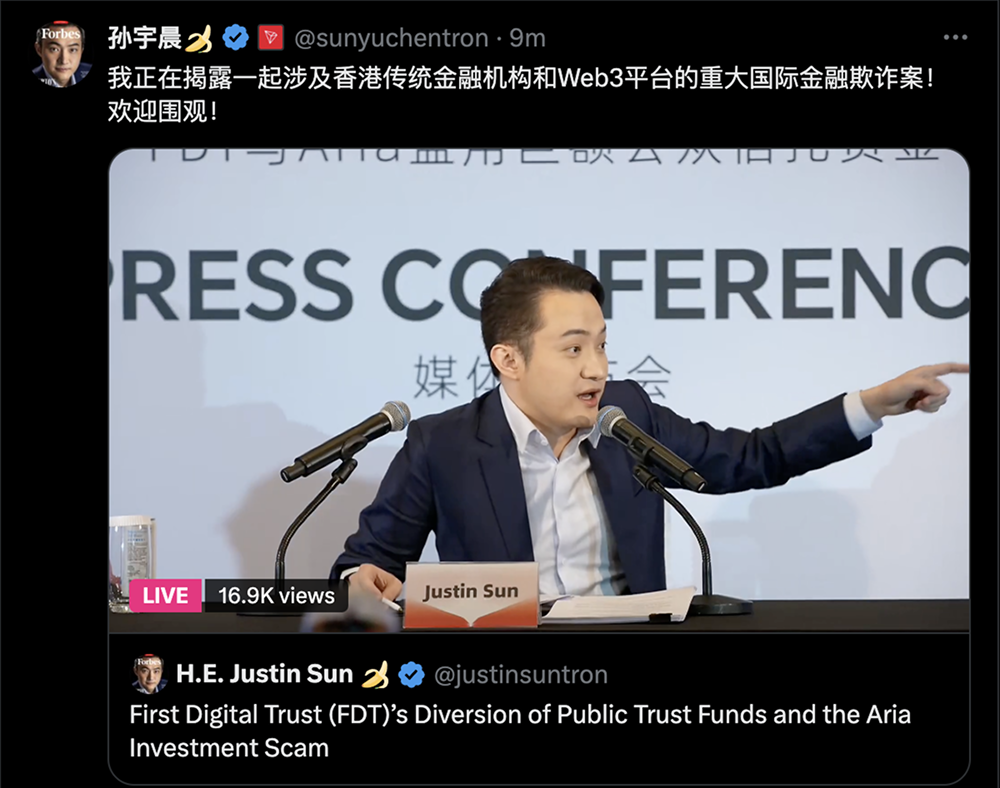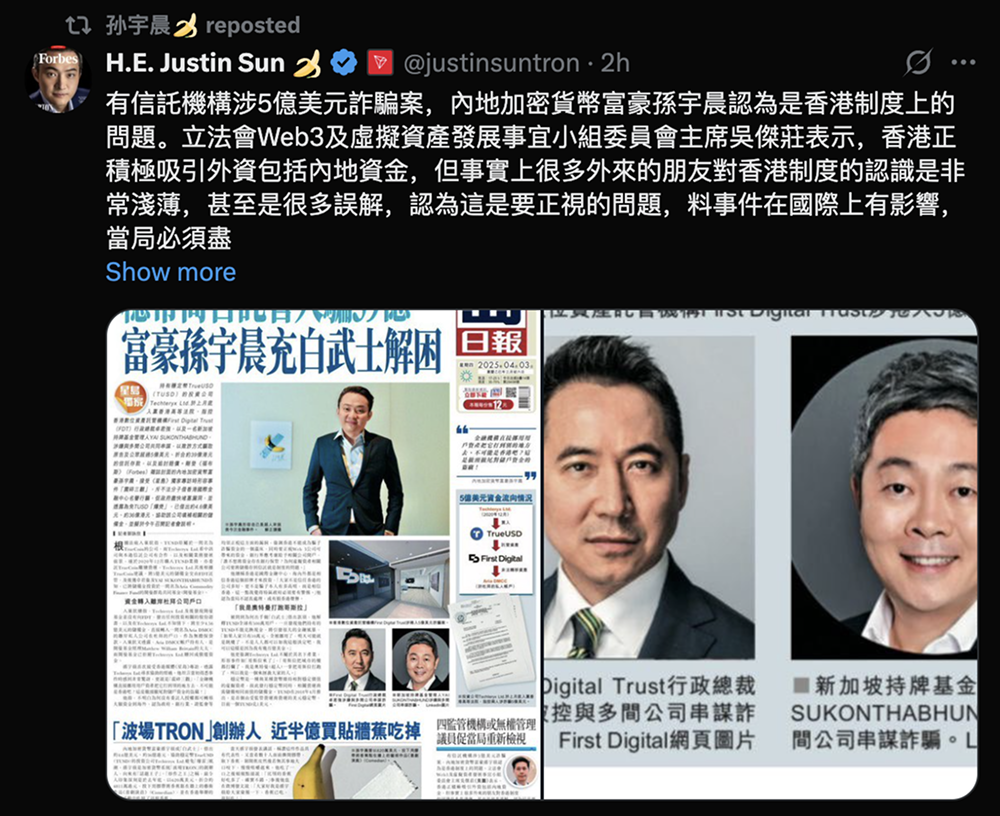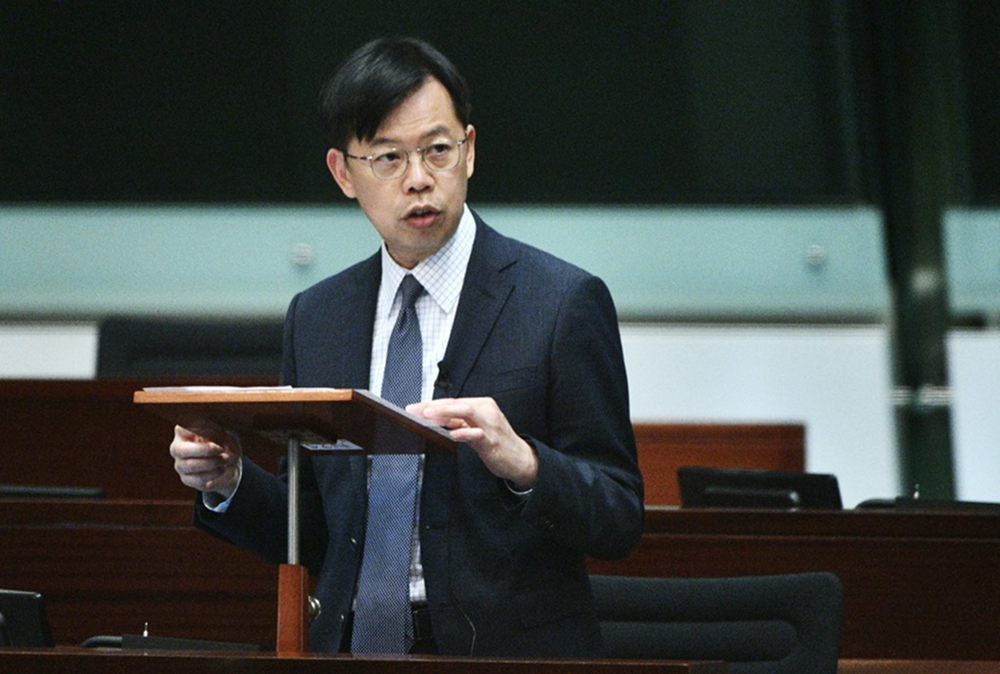First Digital Trust (FDT), a technology-driven financial institution headquartered in Hong Kong, has been accused of illegally misappropriating public funds, leading to public criticism from mainland cryptocurrency tycoon Justin Sun. Sun pointed out the loopholes in Hong Kong's system, urging users to withdraw their investments quickly and calling for regulatory intervention. Meanwhile, members of the Hong Kong Legislative Council also responded swiftly, with the chairman of the Web3 and Virtual Assets Development Subcommittee, Wu Jiezhuang, and financial sector legislator Chan Chun-ying emphasizing the need to reassess the regulatory framework and reminding investors to act cautiously. This incident not only exposes potential blind spots in Hong Kong's financial regulation but also puts the city's international reputation to the test.

Event Overview: FDT in Crisis, Justin Sun Issues Warning
First Digital Trust claims to be Asia's leading digital asset service provider, with products including the stablecoin FDUSD, which once had a market valuation of $3.4 billion. However, on April 2, 2025, Justin Sun posted on social media platform X, stating that FDT was "insolvent" and unable to redeem customer funds, advising users to "take immediate action to protect their assets." He further pointed out that the issues involving FDT were related to its management of the TrueUSD (TUSD) stablecoin, claiming that $456 million in reserve funds were frozen in unauthorized investments. Sun's remarks acted like a bombshell, quickly triggering market panic.
FDT quickly refuted the claims, stating that Sun's accusations were "completely false," emphasizing that the controversy only involved TUSD, not FDUSD, and asserting that its FDUSD stablecoin is backed 1:1 by U.S. Treasury bonds, with funds being safe and transparently traceable. A company spokesperson further accused Sun's statements of being a "smear campaign against a competitor" and announced plans to take legal action to defend its reputation. However, FDT's clarification did not quell external doubts; instead, it led people to question its internal management and the effectiveness of Hong Kong's regulatory system.

Justin Sun's Perspective: "Loopholes" in Hong Kong's System
In a post on April 3, he stated that the issues with FDT were "just a statement of fact, devoid of emotional color," and pointed the finger at Hong Kong's trust regulatory framework, believing it has "significant loopholes." He called for Hong Kong's regulatory agencies and law enforcement to act swiftly to prevent further damage and planned to hold an online press conference that day to elaborate on his position.
Sun's remarks are not without basis. In recent years, as the virtual asset industry has rapidly developed in Hong Kong, relevant regulatory policies have made some progress but have been criticized for lagging behind market demands. The Hong Kong Securities and Futures Commission (SFC) introduced regulatory guidelines for virtual asset trading platforms in 2023 and plans to officially implement a sandbox program for stablecoin issuers in June 2025, but there remain gray areas in the management of trust institutions. Sun's accusations undoubtedly brought this issue to the forefront.
Legislative Council Response: Regulatory Reform is Urgent
After the incident was exposed, the Hong Kong Legislative Council responded quickly. Wu Jiezhuang, chairman of the Web3 and Virtual Assets Development Subcommittee, stated in an interview with Sing Tao Daily that Hong Kong is actively attracting foreign investment, including from mainland China, but this incident has exposed the "superficial understanding or even misunderstanding" of Hong Kong's system by outsiders. He admitted that many foreign investors lack a deep understanding of Hong Kong's trust and financial regulatory systems, which is a problem that needs to be addressed. Wu further pointed out that this $500 million fraud case could have negative international repercussions, and authorities must "quickly reassess different regulatory systems" to address societal concerns and rebuild confidence.
Meanwhile, legislator Chan Chun-ying analyzed the differences between Hong Kong and mainland trust systems from a professional perspective. He explained that trusts in mainland China primarily focus on investment financial products, usually managed by banks, while trust companies in Hong Kong mainly assist clients in managing trust assets, covering a wide range of areas including Mandatory Provident Fund, insurance, and investments. However, if assets are managed by trust companies in corporate form, they may fall into the regulatory blind spots of Hong Kong's four major regulatory bodies—the SFC, the Mandatory Provident Fund Schemes Authority, the Insurance Authority, and the Hong Kong Monetary Authority. Chan warned that this design could lead to regulatory gaps and urged investors to thoroughly investigate the background of trust institutions when making choices.

Systemic Loopholes or Individual Operational Errors?
Is the FDT incident an operational error of an individual company, or a systemic issue within Hong Kong's regulatory system? This has become the focal point of current debates. Supporters of Sun's viewpoint argue that Hong Kong's regulation in the virtual asset and trust sectors has not kept pace with industry development. For instance, although FDT claims to have obtained ISO27001 information security certification and is regulated under Hong Kong's trust regulations, the transparency of its fund flows and internal governance remains questionable. Conversely, opponents argue that FDT's issues stem more from poor internal management rather than systemic flaws. After all, Hong Kong's financial regulatory system enjoys a strong global reputation, making it difficult to generalize.
Where Do Investors Go from Here?
For ordinary investors, this incident brings not only a crisis of trust in FDT but also a reevaluation of the entire virtual asset ecosystem in Hong Kong. Chan Chun-ying's advice is straightforward: investors must act cautiously and conduct thorough investigations into the background, fund flows, and regulatory compliance of trust companies. Meanwhile, Sun's warning also reminds users that taking swift action during a crisis may be key to protecting their assets.
However, for those who have already invested in FDT, the current situation is filled with uncertainty. FDT has promised to hold a public Q&A session on April 3 at 4 PM in X Spaces to clarify the controversy, but whether it can restore market confidence remains to be seen. Meanwhile, the silence of Hong Kong's regulatory agencies is also concerning, and the public is eager for them to take action quickly, whether to investigate FDT or respond to systemic doubts.
International Impact and Future Outlook
Wu Jiezhuang's prediction of "international impact" is not mere rhetoric. As a financial center in Asia, any disturbance in Hong Kong's regulatory environment could ripple through global markets. If the FDT incident is mishandled, it could not only shake investors' confidence in Hong Kong's virtual asset industry but also affect its ability to attract foreign investment. Conversely, if Hong Kong can seize this opportunity to improve its regulatory framework, it may find a turning point in the crisis, further solidifying its position in the global fintech arena.
Overall, the FDT's involvement in a $500 million fraud case is a microcosm of a multi-party game—Justin Sun's fierce accusations, FDT's strong rebuttals, and the Legislative Council's reflections and calls intertwine to create a complex picture. For Hong Kong, this is not only a test for trust institutions but also a trial of the resilience of its regulatory system. In the coming weeks, as investigations deepen and various parties express their positions, the direction of this incident will gradually become clear. For investors and observers, this is undoubtedly a moment worth closely monitoring.
This article represents the author's personal views and does not reflect the stance or views of this platform. This article is for informational sharing only and does not constitute any investment advice to anyone.
AiCoin Official Website: aicoin.com
Telegram: t.me/aicoincn
Twitter: x.com/AiCoinzh
Email: support@aicoin.com
Group Chat: Customer Service Yingying、Customer Service KK
免责声明:本文章仅代表作者个人观点,不代表本平台的立场和观点。本文章仅供信息分享,不构成对任何人的任何投资建议。用户与作者之间的任何争议,与本平台无关。如网页中刊载的文章或图片涉及侵权,请提供相关的权利证明和身份证明发送邮件到support@aicoin.com,本平台相关工作人员将会进行核查。




